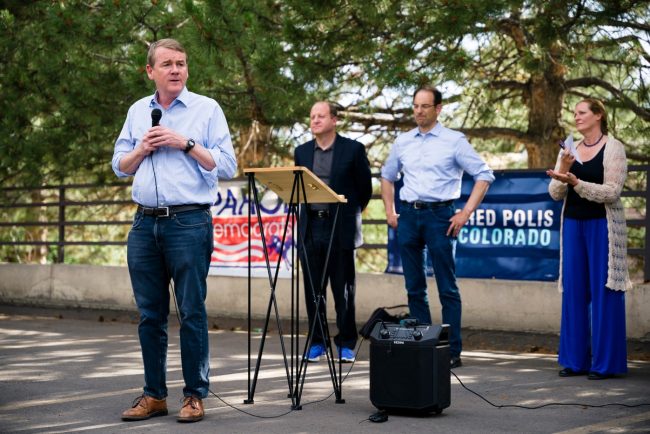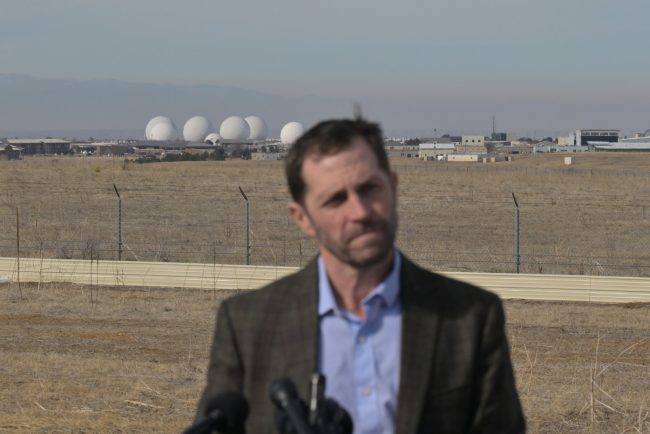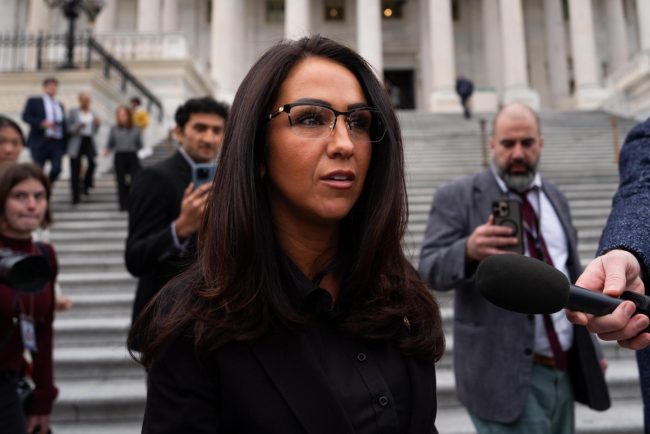
Endorsement: Fund services for victims with a tax on guns. Yes on Proposition KK.
If a crime or tragedy happens in Colorado, the second person a victim talks to after the police is often an advocate from one of the dozens of organizations primarily funded by a dwindling pot of fede
Endorsements
Where is Trump’s concern for conditions in federal detention centers? (Letters)
I find it fascinating and ironic that this same DOJ has chronically overlooked similar issues in regard to the handling of the migrants who have been systematically grabbed without warrants. — David
Columnists
Drawn to the News: Putin
Steve Sack, The Minneapolis Star-Tribune Jeff Koterba, Omaha World-Herald
Cartoons


Coloradans shouldn’t pay for Xcel’s coal mistakes (Opinion)
In a shocking twist, the state of Colorado just sided with Xcel Energy and petitioned regulators to keep the Comanche 2 unit open past its retirement date scheduled for the end of the year to cover f
OpinionJust last year, Colorado was leading the Mountain West in the transition from dirty coal plants to clean energy. Federal funding was assisting on rural clean energy while coal plant retirement dates were on track to meet the state’s critical climate goals.
How quickly things change.
This year the Trump administration is resisting coal’s decline with unprecedented executive orders and by actively canceling and stalling clean energy projects meant to bring down energy prices, killing thousands of renewable energy jobs.
Unfortunately, some Pueblo County leaders and Congressman Jeff Hurd joined in and informed Colorado regulators that they intend to ask President Trump to keep coal-fired operations at Pueblo’s Comanche 2 and 3 coal units continuing indefinitely.
The sudden push to keep coal burning is a slap in the face to Colorado voters who have supported renewable energy, more affordable bills, and who are demanding cleaner air. Surely they could expect Gov. Polis to step in to defend the state’s critical climate goals, right?
Apparently not. In a shocking twist, the state of Colorado just sided with Xcel Energy and petitioned regulators to keep the Comanche 2 unit open past its retirement date scheduled for the end of the year to cover for Comanche 3’s most recent, massive outage.
In effect, this agreement would allow Xcel Energy to charge customers for its own mistakes. If approved, Xcel Energy can run Comanche 2 for an additional year without clear guidelines to restrict pollution. This means the company could run Comanche 2 past its retirement date in addition to Comanche 3 once it’s repaired. Instead of one coal unit burning in 2026, there could be two — a full abandonment of previous commitments, which could increase air pollution and potentially raise energy costs for Coloradans.
Comanche 3 has been a reliability disaster and its pollution contributes to disease and cancer. Given its high cost–both financially and in its toll on public health–and its frequent outages, backtracking on coal retirements has nothing but downsides for Pueblo and Xcel ratepayers.
As a local environmental justice policy advocate, I’ve participated in an enormous amount of debates over what to do about Comanche 3 and have talked to countless people in the community. People want clean energy and good-paying jobs.
Xcel’s motivations are clear. Coal is expensive and they have a captive customer base allowing them to send big profits to their shareholders and CEOs. These profits are earned off the backs of workers while pollution costs the public millions in healthcare bills.
A truly “just” transition should include treating Pueblo with respect, addressing historical inequities like those experienced by the Pueblo community, and giving back to the community for helping to power Colorado for decades at the expense of its own public health.
A recent study found an advanced Renewable Energy Park could replace $40 million in lost annual tax revenue and provide 300 permanent jobs. That’s more money and more jobs than Comanche 3 is providing now. Pueblo could continue exporting power in Colorado, but this time with cleaner air and lower costs. Instead of only gratifying profits, we can advocate for utilities like Xcel to prioritize massive buildouts of rooftop solar to help reduce energy bills for families and businesses.
In Colorado, jobs in the clean energy sector are already outpacing jobs in fossil fuel industries and wages in renewable energy are outpacing the national average which could benefit Pueblo’s economic future while also protecting workers, public health, and the environment.
If you agree that Colorado needs to move past coal and embrace our renewable energy future, I encourage you to contact the Public Utilities Commission and tell them we don’t need federal and corporate interference in already settled matters. Let them know that you believe a just energy transition should address the historic inequities resulting from Xcel’s coal plant as well as our current climate realities with the implementation of a renewable energy park that can provide jobs and tax revenues with little or no pollution.
Jamie Valdez is a community advocate from Pueblo and works with GreenLatinos as a Colorado Transportation and Energy Advocate.
Sign up for Sound Off to get a weekly roundup of our columns, editorials and more.
To send a letter to the editor about this article, submit online or check out our guidelines for how to submit by email or mail.

Despite Bennet’s numerous endorsements, Weiser is the proven fighter (Letters)
Despite Bennet’s numerous endorsements, Weiser is the proven fighter Re: “Election 2026: Heavyweight bout,” Nov. 16 news story Just days after the hottest November day on record for Denver, Sunday’s Denver Post described Colorado’s two competing Democratic gubernatorial candidates as heavy hitters. While Attorney General […]
LettersDespite Bennet’s numerous endorsements, Weiser is the proven fighter
Re: “Election 2026: Heavyweight bout,” Nov. 16 news story
Just days after the hottest November day on record for Denver, Sunday’s Denver Post described Colorado’s two competing Democratic gubernatorial candidates as heavy hitters. While Attorney General Phil Weiser was reported to have sued the Trump administration more than 40 times, the article also briefly mentioned that Sen. Michael Bennet may experience voter “blowback” for controversial Trump nominee cabinet votes.
Significantly, an Associated Press article published Nov. 8 in The Denver Post described condemnation of the U.N. Climate Summit by Colorado’s former CEO of Liberty Energy (a fracking services company), U.S. Energy Secretary Chris Wright, a Trump nominee for whom Bennet broke ranks to support in January.
The AP article reported that Wright, a scientist, defied “global scientific consensus and concern by governments worldwide on climate change,” calling it a “hoax” just as the U.N. climate summit was convening to promote urgent global action to prevent irreversible harm.
Bennet’s yes vote for Wright, despite knowledge that Wright had no government experience, and November reports that he had downplayed the importance of renewables, was bullish on nuclear and “was skeptical about the need to address climate change” (Axios) did not show understanding of Colorado’s destructive impacts from extreme weather events largely the result of carbon emissions — wildfires, drought, floods, interstate and international climate refugees, and increasing homeowner insurance rates.
The Trump administration has steadily attacked Colorado from government job cuts to undermining our economy by slashing federal investment and creating fear and division. Governor candidates’ actions speak louder than words.
Julie Zahniser, Boulder
I am still scratching my head. Why did Sen. Michael Bennet jump into the race? Two more years to go in the Senate, and Bennet has decided that he wants another job. Huh? We elected you for 6 years. It would have been a non-issue if we had not had an amazing candidate for governor. But Attorney General Phil Weiser is (without question) the most qualified person to be governor. And then Bennet decides to do this after Phil announced.
And then Reps. Jason Crow, Joe Neguse, and Brittany Pettersen jump to endorse — perhaps hoping for a Senate nod. Why? He has received half a million dollars from former New York City Mayor Michael Bloomberg. And frankly, Bennet does not have the executive experience (maybe being Hickenlooper’s chief of staff while mayor). I am tired of Washington picking our candidates – Bennet needs to stay in the Senate. We need a fighter. We need Phil Weiser.
Scott Simmons, Windsor
Yes, Trump did condemn the neo-Nazis and the white nationalists
Re: “Blurring fact and fiction,” Nov. 16 commentary
This commentary with odd reasoning effectively calls President Donald Trump a racist and white supremacist, with references to his administration as Nazis and the president to Hitler and Mussolini. This amounts to adding to the continuation of leftist progressives’ name-calling because they can’t otherwise counter common-sense positions of the current administration, and is irresponsible because it could lead to impressionable and otherwise uninformed and mentally off persons to try to become a hero by assassinating the evil authoritarian.
The author’s entire barrage of commentary is plainly untruthful, as shown in reference to the August 2017 incident in which protestors were in favor of or against the removal of a statue of Robert E. Lee in Charlottesville, Virginia, that turned violent. Author Angie Chuang claimed it wasn’t clear what Trump meant when he said, “I think there is blame on both sides. You had some very bad people in that group. You also had some very fine people on both sides.”
What he conveyed in his comments was that there were bad people (violent) on both sides and there were fine people (peaceful) on both sides who were either for or against removing the historical statue and renaming the park it was in. He said clearly regarding “fine” people, “I’m not talking about the neo-Nazis and the white nationalists, because they should be condemned totally.” Because the author didn’t point this out, the editorial should be totally discounted.
Steve Lloyd, Cheyenne
Declaring war at the Air Force Academy
Re: “The U.S. Air Force Academy is on the brink of failure,” Nov. 16 commentary
Former visiting professor Thomas Bewley presented a well-documented analysis of the collapse of academics at the Air Force Academy and a thoughtful plan to reverse this trend. His efforts will be for nought.
Secretary for War Pete Hegseth, acting at the direction of Donald Trump, has little, if any, interest in the creation of a thoughtful and ethical officer corps. Their notion of a proper U.S. military is one that will immediately carry out the orders of the Commander-in-Chief – whether those orders are legal or not.
Despite the fact that U.S. actions contravene international law, the administration delights in presenting videos that show the killing of civilians in boats off the coast of South America. To my knowledge, no member of the U.S. military has refused to carry out these orders.
The ethos of the Trump administration is to develop a U.S. military that will unthinkingly “kill on command.” Academic excellence plays no part in this. Mindless obedience to orders does.
Guy Wroble, Denver
I read with sadness the article concerning the Air Force Academy’s problem with departing educators. The author missed one point: This was caused by the current administration and the Department of Defense Secretary. These non-patriotic persons care not a bit about education for recruits in the academy, only teaching their version of truths that they find relevant to their cult.
Independent educators and freedom of opinion is the only way to mold our future leaders and defenders of our precious country. This was created by President Donald Trump and Pete Hegseth and needs to be redone as the programs were meant to be.
Stephen Luxenberg, Coral Springs, Fla.
How can we turn backs on our Afghan allies?
Re: “Protect our allied Afghans from Trump,” Nov. 16 commentary
Krista Kafer has joined David Brooks as my two favorite Republicans! Great, compassionate, and spot-on column about protecting humanitarian immigrant visas. How a country like ours can turn its back on people who have put their lives at risk for us is indeed unconscionable. Thank you, Ms. Kafer!
Dan Eberhart, Denver
After reading Krista Kafer’s column regarding deportations, I am gaining more respect for her.
Yes, we should protect our allied Afghans from Trump, but she goes further, saying how she wonders how a large and wealthy country can turn its back on people fleeing death and imprisonment, and calling it unconscionable.
We are a nation of immigrants and former President Ronald Reagan gave an impassioned speech that accepting immigrants separated us from the majority of the other countries in the world. They helped make our economy the envy of the world.
Krista, congratulations on an insightful column.
Dave Shaw, Highlands Ranch
I want to congratulate Krista Kafer’s opinion regarding the treatment of the Afghan refugees as a whole and Mohammad Ali Dadfar in particular.
Thank you for highlighting the efforts of Reps. Jason Crow and Joe Neguse to help him. I then searched for information on the other Colorado House members and their comments or actions. Rep. Diana DeGette has been vocal on her support of Afghan refugees as has Rep. Brittany Pettersen.
On the GOP side, I could only find one reference to Afghan refugees attributed to Reps. Jeff Hurd, Gabe Evans, or Lauren Boebert. That was Rep. Lauren Boebert being one of the 16 Republicans who voted no on the Jason Crow bipartisan bill to make it easier for Afghans who supported U.S. Military actions to get Visas. The Averting Loss of Life and Injury by Expediting SIVs Act (ALLIES) Act. The bill passed 407-16. The silence of both Reps. Hurd and Evans is not surprising, nor is the enmity of Rep. Bobert to the plight of legal immigrants. They are merely following the Trump narrative of hate and cruelty.
Jim McKeeman, Aurora
I appreciate your story regarding the detention of one legal immigrant, Mohammad Ali Dadfar, who, with his family, was brought to the U.S. (by the U.S. government) to avoid persecution by the Taliban in Afghanistan. Now he is being persecuted by the Trump administration for the simple crime of being an outsider in this country that has traditionally prided itself on welcoming immigrants from all lands. The Trump regime is applying “guilty until proven innocent” thinking to legal immigrants who are, unfortunately, swept up by raids in locales where many immigrants reside. The Statue of Liberty should be blindfolded and placed in a museum of antiquities. Thank you for speaking out!
Kathy McCartney, Lakewood
Sign up for Sound Off to get a weekly roundup of our columns, editorials and more.
To send a letter to the editor about this article, submit online or check out our guidelines for how to submit by email or mail.

Coloradans shouldn’t pay for Xcel’s coal mistakes (Opinion)
Just last year, Colorado was leading the Mountain West in the transition from dirty coal plants to clean energy. Federal funding was assisting on rural clean energy while coal plant retirement dates were on track to meet the state’s critical climate goals. How quickly things […]
ColumnistsJust last year, Colorado was leading the Mountain West in the transition from dirty coal plants to clean energy. Federal funding was assisting on rural clean energy while coal plant retirement dates were on track to meet the state’s critical climate goals.
How quickly things change.
This year the Trump administration is resisting coal’s decline with unprecedented executive orders and by actively canceling and stalling clean energy projects meant to bring down energy prices, killing thousands of renewable energy jobs.
Unfortunately, some Pueblo County leaders and Congressman Jeff Hurd joined in and informed Colorado regulators that they intend to ask President Trump to keep coal-fired operations at Pueblo’s Comanche 2 and 3 coal units continuing indefinitely.
The sudden push to keep coal burning is a slap in the face to Colorado voters who have supported renewable energy, more affordable bills, and who are demanding cleaner air. Surely they could expect Gov. Polis to step in to defend the state’s critical climate goals, right?
Apparently not. In a shocking twist, the state of Colorado just sided with Xcel Energy and petitioned regulators to keep the Comanche 2 unit open past its retirement date scheduled for the end of the year to cover for Comanche 3’s most recent, massive outage.
In effect, this agreement would allow Xcel Energy to charge customers for its own mistakes. If approved, Xcel Energy can run Comanche 2 for an additional year without clear guidelines to restrict pollution. This means the company could run Comanche 2 past its retirement date in addition to Comanche 3 once it’s repaired. Instead of one coal unit burning in 2026, there could be two — a full abandonment of previous commitments, which could increase air pollution and potentially raise energy costs for Coloradans.
Comanche 3 has been a reliability disaster and its pollution contributes to disease and cancer. Given its high cost–both financially and in its toll on public health–and its frequent outages, backtracking on coal retirements has nothing but downsides for Pueblo and Xcel ratepayers.
As a local environmental justice policy advocate, I’ve participated in an enormous amount of debates over what to do about Comanche 3 and have talked to countless people in the community. People want clean energy and good-paying jobs.
Xcel’s motivations are clear. Coal is expensive and they have a captive customer base allowing them to send big profits to their shareholders and CEOs. These profits are earned off the backs of workers while pollution costs the public millions in healthcare bills.
A truly “just” transition should include treating Pueblo with respect, addressing historical inequities like those experienced by the Pueblo community, and giving back to the community for helping to power Colorado for decades at the expense of its own public health.
A recent study found an advanced Renewable Energy Park could replace $40 million in lost annual tax revenue and provide 300 permanent jobs. That’s more money and more jobs than Comanche 3 is providing now. Pueblo could continue exporting power in Colorado, but this time with cleaner air and lower costs. Instead of only gratifying profits, we can advocate for utilities like Xcel to prioritize massive buildouts of rooftop solar to help reduce energy bills for families and businesses.
In Colorado, jobs in the clean energy sector are already outpacing jobs in fossil fuel industries and wages in renewable energy are outpacing the national average which could benefit Pueblo’s economic future while also protecting workers, public health, and the environment.
If you agree that Colorado needs to move past coal and embrace our renewable energy future, I encourage you to contact the Public Utilities Commission and tell them we don’t need federal and corporate interference in already settled matters. Let them know that you believe a just energy transition should address the historic inequities resulting from Xcel’s coal plant as well as our current climate realities with the implementation of a renewable energy park that can provide jobs and tax revenues with little or no pollution.
Jamie Valdez is a community advocate from Pueblo and works with GreenLatinos as a Colorado Transportation and Energy Advocate.
Sign up for Sound Off to get a weekly roundup of our columns, editorials and more.
To send a letter to the editor about this article, submit online or check out our guidelines for how to submit by email or mail.

Colorado’s Lauren Boebert stands up for Epstein’s victims (Letters)
I am amazed that I now consider Rep. Lauren Boebert and Rep. Marjorie Taylor Greene to be heroes. — Daniel Badher, Denver
LettersStanding up for the Epstein victims and decency
Re: “Release the Epstein files, and let’s get rid of the ‘Epstein class’,” Nov. 19 commentary
Anita Chabria makes a good point about the oligarchy, their arrogance, and not-so-innocent interaction with girls. It is time to out those folks and get them off the public stage.
She acts as if publicizing the files is a Democratic coup. Why didn’t they do this when they had the majority?
This vote is a victory for decency and common sense. And let us hope it is a sign that Congress is finding its spine.
Stan Moore, Lakewood
I am amazed that I now consider Rep. Lauren Boebert and Rep. Marjorie Taylor Greene to be heroes. They met with the Epstein victims and have resolutely stood solid with the victims since. No Republican congressmen can say that. If any of the congresswomen had caved, President Donald Trump would not have been forced to back the bill. Yeah, Boebert!
Daniel Badher, Denver
Trump’s ‘Quiet, piggy’ remark demonstrates insecurity
On Friday, President Trump’s attack on a reporter asking about the Jeffrey Epstein files — pointing a finger and snarling “Quiet, piggy” — was more than rude. It was a blatant attempt to silence a journalist simply doing her job.
We’ve seen hostility toward the press before, from Nixon to Agnew, but this level of contempt makes those moments seem mild. Finger-pointing, name-calling, and mocking a reporter’s legitimacy are not signs of strength — they are signs of insecurity and disregard for transparency.
America should welcome tough questions. Journalists are not intruders or “piggies”; they are essential to holding power accountable. When the leader of our nation dismisses a question with personal insult, it undermines the democratic ideals we claim to uphold.
Civility in public discourse matters. Respect for the press matters. And in this case, “Quiet, piggy” should matter to every American concerned about the health of our democracy.
Dan Wilinsky, Englewood
Saudi prince doesn’t deserve Trump’s celebration
Re: “Trump dismisses intelligence that prince was likely aware of killing,” Nov. 19 news story
Just what do our long-term allies think now? Presidents and prime ministers from around the globe have crossed the threshold of the White House, yet none of them have received the pompous greeting that President Donald Trump gave to Mohammed bin Salman.
This is the man who has been identified by our country for ordering the assassination of a journalist working for the Washington Post. He is also the ruler of the nation from which many of the 9/11 attackers came to kill thousands of our fellow Americans. It was so obvious that Trump was gleeful. This open affection has never been shown to any other leader. None of them has been given such a dinner.
We all know the Trump family has multiple businesses in Saudi Arabia. What exactly is going on?
Barbara Wells, Aurora
Time running out for Colorado delegates to help extend health tax credits
I know how it feels to hear the words, “You have cancer.” The sentence sucks the air out of the room. Your mind sprints to all the plans you had for your future. Everything hangs on that next question: Is it treatable? The answer has a lot to do with whether you have health insurance.
Cancer care is expensive. Without comprehensive health insurance, it’s out of reach.
For the hundreds of thousands of Coloradans who rely on enhanced health care tax credits to afford their health insurance through Connect for Health Colorado, Congress currently holds the answer to that next question. You see, some of these health care tax credits are set to expire at the end of this year. But Congress can do something about that by extending these enhanced tax credits.
With open enrollment underway, Coloradans are seeing their premiums skyrocket for next year’s plans. If the enhanced health care tax credits aren’t extended, millions of people, including cancer patients, will lose access to lifesaving care.
I’m urging Rep. Gabe Evans and Rep. Jeff Hurd to consider the people who are depending on these tax credits to access health coverage. Work with your fellow members of Congress to extend them now. Time is running out.
Sabrina Wright-Hobart, Aurora
Sign up for Sound Off to get a weekly roundup of our columns, editorials and more.
To send a letter to the editor about this article, submit online or check out our guidelines for how to submit by email or mail.

The pain of lost family and someone else’s Thanksgiving (Opinion)
My first Thanksgiving at my beau’s family table, I hid in the bathroom a half-dozen times to check my watch. Can we leave yet? Despite the lifelong ache to have my own regular family, with generations of happy family gatherings, and despite the steady, routine […]
ColumnistsMy first Thanksgiving at my beau’s family table, I hid in the bathroom a half-dozen times to check my watch. Can we leave yet?
Despite the lifelong ache to have my own regular family, with generations of happy family gatherings, and despite the steady, routine absence of all that — thank you addiction, suicides, and estrangements — I resolve to not let my dread of others’ family holiday gatherings show.
“Go where the happiness is,” the therapists chant. And I have. For decades. But the reality is that there is a muscle necessary to steel one’s heart so we can keep walking in and smiling at other people’s families. That muscle keeps getting trained. Weight trained.
I’ve hosted many non-familial Thanksgivings, full of the lonely, the broken, the single, and the alone, this year, for whatever reason.
I roast the turkey, decorate, set the table, and light the candles. It is lovely. Often, we stack dishes and move to the piano. I throw great parties, so we haul out all the Billy Joel, Olivia Newton-John, and Beatles lyrics, and we have a sing-along.
We have dessert and dessert wines, and maybe coffee with liqueurs. We banter about the best pecan and pumpkin pies we’ve ever tasted and swear to make the French bourbon cheesecake someone had in Italy for next year’s gathering.
It is joyful in its way — boisterous, tipsy, unorthodox.
But it is not family. We are not related. We do not share private medical information because high cholesterol and a weak heart run rampant on your father’s side. We did not, together, hold our mother’s hand when she passed. We did not attend each other’s children’s births, as blood-related people often do.
It’s a meal, held on a holiday.
At some point, you meet someone somewhere along the way and now you’re sharing their family’s holiday celebration, one populated by someone else’s blood.
This is the part where you’re supposed to feel grateful. And there are moments when you do. But if your family members are addicted, or died young, or suffer mental illness or are a combination of any of that, you are reminded anew that these dynamics are often multi-generational. Addicts take hostages. They do not have relationships. So if your family is in that pool, holidays can only be peaceful with other people.
And sometimes they are not your relatives.
What no one wants at any family holiday table is bitterness, mental illness, or unresolved substance messiness. No one wants the sad facts of real life to puncture the bubble of happy, shared, familial history revisited at the holiday feast. If blood is that, then attending someone else’s Thanksgiving, or just chucking it and going to a movie, is the default.
I am hardly alone. A 2024 Boise State report says that 61% of Americans experience sadness or loneliness during the holiday season and 37% would prefer to skip the holidays entirely.
A November 2024 Harris Poll found that 50% of U.S. adults are currently estranged from at least one close relation, and, among those, 35% are estranged from an immediate family member such as a parent or sibling.
And that is often the most verboten element, the one never brought up but often fibbed about to the others who are clinking glasses, laughing, and reminiscing: estrangement. Who wants to talk about being forced to choose peace over calamity when choosing peace means being alone?
There is stigma in estrangement. Assumptions are made, faces turn dark, and holiday meal revelers suddenly need to take the dog out because estrangement is sad. Estrangement is a bummer and, especially to those who’ve never experienced it, suggests the notion that it may be your fault.
Whether it is or is not, the result is the same. You are not with them because being so is impossible. That is the heartbreak. Moreover, heartbreak can feel amplified when you’re with those who don’t know this sorrow.
It can be so very lonely, even — often especially — because you feel you’re the only one.
My beau and his family graciously include me in their holiday gatherings. This is a loving and lovely gesture.
But it can be hard not to feel the loss of one’s own blood, not being there. It is his daughter who serves her famous sweet potato casserole. Those are his in-laws who turn on the game and then lovingly bicker.
In the past 10 years, my sibling and my daughter died young. In the previous 10 years, another sibling died young, and yet another the previous decade.
What if that 61% of Americans who, according to the Boise State study, feel sad during the holidays did not have to pretend joy-to-the-world at others’ joyous occasions? What if holiday tables and the people populating them realized that half of their holiday table is struggling mightily?
Is it possible that the holidays and the people who gaily celebrate them give 30 seconds of thought to the 50% of U.S. adults currently estranged from a close relative?
Maybe, collectively, the holiday and all the joy-to-the-world memes might hold a tender spot for those with the tenderest of hearts.
Yes, we can volunteer at homeless shelters, and yes, we can help serve Thanksgiving dinner to those who cannot afford one. Volunteering can and does help mend broken hearts.
But maybe we’d like to be at the table, our souls and hearts broken wide open, guts and all, for all to see, to bear witness. No one’s trying to kill the party. But there’s nothing like a forced party to turn the knife even more.
I know that feeling, this and speaking to it is not popular. After all, if 61% want it to all be over with as soon as possible, then 39% love every Hark-the-Herald note of it.
Maybe there’s room for both. That is what I am saying. Maybe the spectrum can provide love and thanksgiving for both. Maybe your widowed uncle across the table, whose son is in a group home for early-onset dementia, doesn’t feel up to raising a glass.
Maybe he does not feel up to being around people and so stays away as a buffer against others’ group gaiety.
But he may be up for someone taking him a plate. He may be up for a conversation about his garden. He may be up for that.
And maybe, from November through January 2, we could all remember, perhaps even seek out and comfort that 50% suffering estrangement or that 37% who want it all to be over with.
Cathie Beck is a Denver journalist and author of the award-winning “Cheap Cabernet: A Friendship.” Her new memoir, “Hoodbitch on the Near Eastside,” will be released in 2026.
Sign up for Sound Off to get a weekly roundup of our columns, editorials and more.
To send a letter to the editor about this article, submit online or check out our guidelines for how to submit by email or mail.

We need courage to change course on the Colorado River (Opinion)
The Colorado River is in crisis. The seven basin states just blew through a heavily anticipated deadline to announce a new deal on how they would divide up a dwindling resource. Meanwhile, Lake Mead and Lake Powell are teetering on the brink of collapse, and […]
ColumnistsThe Colorado River is in crisis. The seven basin states just blew through a heavily anticipated deadline to announce a new deal on how they would divide up a dwindling resource. Meanwhile, Lake Mead and Lake Powell are teetering on the brink of collapse, and Mother Nature couldn’t care less about politics or posturing.
It’s time to call out an uncomfortable truth. The system is broken. When the Colorado River Compact was signed in 1922, the Upper and Lower Basins made promises to each other that they can’t keep in an era of climate change, drought, and increased competition for our precious supplies of water. Both basins cling to their entitlements under the Compact like they are lifeboats on a sinking ship.
The Upper and Lower Basins each believe they are entitled to 7.5 million acre feet per year under the Compact (yes, it’s complicated). Recently, however, the Colorado has only produced 11 million acre feet per year with even lower dips. There is a glaring math problem, and it’s obvious that neither basin is going to get everything it wants in this new era of aridification.
We had hoped that the hard-working, well-intentioned people representing the states could figure out how to negotiate around these flaws in the Compact. We had hoped that the Department of the Interior might forge a difficult compromise. And we had hoped that we would occasionally get a lot of snow to cover up all this dysfunction.
Now, it’s quite clear those are unrealistic hopes. While a deal is still possible, it seems unlikely to
solve the long-term conflict. As long as the Upper and Lower Basins hold fast to their presumed entitlements, we’ll likely be managing a crisis on the Colorado River.
This crisis calls out for courageous leadership and a change of course. We need to revisit the allocation of water under the 1922 Compact. After all, it’s been more than 100 years – maybe it’s
time for a tune-up.
The seven governors from the basin states need to sit down in a room and change course to figure out we are going to live together in the Colorado River basin for the next hundred years. They need to set aside their entitlements. And they should be joined by a highly skilled and trusted neutral facilitator charged with brokering a deal. Then they should direct their representatives to fix the Compact. We should honor them for trying and reserve a place in history for their eventual success.
This would also provide a historic opportunity to incorporate the rights of the Tribes into an updated Compact.
If we continue floating adrift, the Supreme Court will eventually be forced to do it for us. That process will be painful, expensive, and slow. It could take decades and cost hundreds of millions of dollars. The river won’t wait.
In the interim, the Secretary of the Interior may have to make some very difficult decisions in managing the system. Both basins must share in this pain. And the fourteen U.S. senators from these seven states must convince Congress to provide more money – bridge funding if you will – to help ease the pain until the governors figure this out.
It will be much more difficult for our kids to solve this problem in twenty or thirty years. Every time we kick the can down the road, we make it that much harder for the next generation to run a family farm, to enjoy nature, or just to drink a glass of clean water.
Harry Truman, who had a role in the history of the Colorado River, once said that in “periods where there is no leadership, society stands still. Progress occurs when courageous, skillful leaders seize the opportunity to change things for the better.”
The Colorado River, and the 40 million people who depend on it, are desperate for courageous people to lead us in a course correction.
Chris Winter is the executive director of the Getches-Wilkinson Center for Natural Resources, Energy, and the Environment at the University of Colorado Law School.
Sign up for Sound Off to get a weekly roundup of our columns, editorials and more.
To send a letter to the editor about this article, submit online or check out our guidelines for how to submit by email or mail.

Trump’s response to Rep. Crow’s video was completely unhinged (Opinion)
President Donald Trump just threatened an elected Colorado representative with arrest, a trial, and execution. The response was unhinged. Trump said in a social media post that Crow and others were guilty of “SEDITIOUS BEHAVIOR, punishable by DEATH.” This is only further evidence that Trump […]
ColumnistsPresident Donald Trump just threatened an elected Colorado representative with arrest, a trial, and execution.
The response was unhinged. Trump said in a social media post that Crow and others were guilty of “SEDITIOUS BEHAVIOR, punishable by DEATH.” This is only further evidence that Trump is unfit to be the president of the United States.
On a daily basis, this president does something so unbecoming of the Oval Office that it makes me question his loyalty to America. Trump has no decency, no moral compass, and the thinnest understanding of American jurisprudence imaginable for someone tasked with leading a country built on freedom and justice.
This outburst of Vladimir Putin-style authoritarianism gives me the perfect opportunity to expose Trump’s failure to rise to what the White House demands – a man who is both poised and in control.
Colorado Rep. Jason Crow joined six other members of Congress who, like Crow, are all former or current members of the U.S. armed services in a social media video. The congressmembers simply remind members of the military that they can disobey orders from their superiors if the orders are illegal.
“This administration is pitting our uniformed military and intelligence community professionals against American citizens. Like us, you all swore an oath to protect and defend this Constitution. Right now, the threats coming to our Constitution aren’t just coming from abroad but from right here at home. Our laws are clear. You can refuse illegal orders. You must refuse illegal orders,” the lawmakers said in video clips spliced together. “No one has to carry out orders that violate the law or our Constitution.”
What, you might ask, could prompt distinguished veterans in the U.S. Congress to issue such a dire reminder? Well, consider the bombing of boats in international waters suspected of smuggling drugs. It might seem to be legally ambiguous to those of us watching boats explode far from U.S. soil, killing all on board without trial. But what if a military checkpoint were established at the Canadian border and members of the army were ordered to take any drivers discovered to have drugs in their vehicles out behind customs’ buildings and shoot them in the head?
Is that legally ambiguous? I agree our military leaders – including U.S. generals – need to start asking themselves how far they would follow a soulless man’s orders, lest they jeopardize their own souls. I would appeal to the generals’ moral compasses, but Crow was smart to instead appeal to U.S. law. As we know, American soldiers are guided first by the U.S. Constitution, the law, and then by orders from their commanders. There is no room for conscientious objectors in war.
American presidents have for generations believed they operate beyond the reproach of the U.S. Constitution in international waters and on foreign soil. But eventually, the U.S. Supreme Court ruled that President George W. Bush’s administration acted unlawfully at times in Guantanamo Bay. Perhaps someone should have reminded the 11 soldiers who faced criminal charges stemming from their actions at Abu Graib prison that they could and should disobey unlawful orders.
Trump’s response to a forceful reminder that individual members of the military can refuse to commit murder if they are ordered to open fire on an unarmed crowd, belies my very concern about Trump. Execution is how he would like to deal with U.S. Rep. Jason Crow and, now, possibly me. I sure hope that if military members are ordered to arrest me for this column, they consider the legality of doing so without an act of Congress. Members of the military cannot make arrests on American soil, and even the U.S. National Guard is prohibited from acting as law enforcement when their orders are coming from the White House rather than the governor’s mansion.
But what if the order was given? Would National Guard members violate the Posse Comitatus Act?
House Speaker Mike Johnson, R-La., said Crow’s message was “dangerous” and “unprecedented in American history.”
Yes, it certainly is an extreme message during an extremely dangerous time for America, and perhaps unprecedented. But if the message in the video takes the debate about Trump’s handling of our military too far, then Trump’s response must be condemned for what it is – a radical and unacceptable escalation.
Crow and his colleagues articulated a worry that has been at the forefront of mind – who in the U.S. military will protect Americans from a lawless president?
Megan Schrader is the opinion editor of The Denver Post.
Sign up for Sound Off to get a weekly roundup of our columns, editorials and more.
To send a letter to the editor about this article, submit online or check out our guidelines for how to submit by email or mail.

Colorado’s Lauren Boebert stands up for Epstein’s victims (Letters)
Standing up for the Epstein victims and decency Re: “Release the Epstein files, and let’s get rid of the ‘Epstein class’,” Nov. 19 commentary Anita Chabria makes a good point about the oligarchy, their arrogance, and not-so-innocent interaction with girls. It is time to out […]
LettersStanding up for the Epstein victims and decency
Re: “Release the Epstein files, and let’s get rid of the ‘Epstein class’,” Nov. 19 commentary
Anita Chabria makes a good point about the oligarchy, their arrogance, and not-so-innocent interaction with girls. It is time to out those folks and get them off the public stage.
She acts as if publicizing the files is a Democratic coup. Why didn’t they do this when they had the majority?
This vote is a victory for decency and common sense. And let us hope it is a sign that Congress is finding its spine.
Stan Moore, Lakewood
I am amazed that I now consider Rep. Lauren Boebert and Rep. Marjorie Taylor Greene to be heroes. They met with the Epstein victims and have resolutely stood solid with the victims since. No Republican congressmen can say that. If any of the congresswomen had caved, President Donald Trump would not have been forced to back the bill. Yeah, Boebert!
Daniel Badher, Denver
Trump’s ‘Quiet, piggy’ remark demonstrates insecurity
On Friday, President Trump’s attack on a reporter asking about the Jeffrey Epstein files — pointing a finger and snarling “Quiet, piggy” — was more than rude. It was a blatant attempt to silence a journalist simply doing her job.
We’ve seen hostility toward the press before, from Nixon to Agnew, but this level of contempt makes those moments seem mild. Finger-pointing, name-calling, and mocking a reporter’s legitimacy are not signs of strength — they are signs of insecurity and disregard for transparency.
America should welcome tough questions. Journalists are not intruders or “piggies”; they are essential to holding power accountable. When the leader of our nation dismisses a question with personal insult, it undermines the democratic ideals we claim to uphold.
Civility in public discourse matters. Respect for the press matters. And in this case, “Quiet, piggy” should matter to every American concerned about the health of our democracy.
Dan Wilinsky, Englewood
Saudi prince doesn’t deserve Trump’s celebration
Re: “Trump dismisses intelligence that prince was likely aware of killing,” Nov. 19 news story
Just what do our long-term allies think now? Presidents and prime ministers from around the globe have crossed the threshold of the White House, yet none of them have received the pompous greeting that President Donald Trump gave to Mohammed bin Salman.
This is the man who has been identified by our country for ordering the assassination of a journalist working for the Washington Post. He is also the ruler of the nation from which many of the 9/11 attackers came to kill thousands of our fellow Americans. It was so obvious that Trump was gleeful. This open affection has never been shown to any other leader. None of them has been given such a dinner.
We all know the Trump family has multiple businesses in Saudi Arabia. What exactly is going on?
Barbara Wells, Aurora
Time running out for Colorado delegates to help extend health tax credits
I know how it feels to hear the words, “You have cancer.” The sentence sucks the air out of the room. Your mind sprints to all the plans you had for your future. Everything hangs on that next question: Is it treatable? The answer has a lot to do with whether you have health insurance.
Cancer care is expensive. Without comprehensive health insurance, it’s out of reach.
For the hundreds of thousands of Coloradans who rely on enhanced health care tax credits to afford their health insurance through Connect for Health Colorado, Congress currently holds the answer to that next question. You see, some of these health care tax credits are set to expire at the end of this year. But Congress can do something about that by extending these enhanced tax credits.
With open enrollment underway, Coloradans are seeing their premiums skyrocket for next year’s plans. If the enhanced health care tax credits aren’t extended, millions of people, including cancer patients, will lose access to lifesaving care.
I’m urging Rep. Gabe Evans and Rep. Jeff Hurd to consider the people who are depending on these tax credits to access health coverage. Work with your fellow members of Congress to extend them now. Time is running out.
Sabrina Wright-Hobart, Aurora
Sign up for Sound Off to get a weekly roundup of our columns, editorials and more.
To send a letter to the editor about this article, submit online or check out our guidelines for how to submit by email or mail.

They fled the Taliban, legally entered the U.S. and now Trump is detaining them (Opinion)
Music was the topic in our English practice session. “What is music like in Afghanistan?” one of us asked. “Music not allowed,” said one of the women. “Taliban,” said another pantomiming the bucking recoil of a machine gun. “Hurt you.” If these women are ever […]
ColumnistsMusic was the topic in our English practice session. “What is music like in Afghanistan?” one of us asked. “Music not allowed,” said one of the women. “Taliban,” said another pantomiming the bucking recoil of a machine gun. “Hurt you.”
If these women are ever sent back, they will be imprisoned or worse, even if they do so much as hum a tune. Their husbands worked with the U.S. government during our 20-year presence in Afghanistan. After the country fell to the Taliban, these Afghans got a target on their back. Many fled with their families to neighboring Iran or Pakistan while others traveled bravely to the other side of the world.
Recognizing our responsibility to protect to these allied Afghans, the U.S. has enabled thousands to come here legally as refugees, special immigrant visa holders, and humanitarian parolees. The later requires individuals apply for asylum, a long process that requires applicants meet regularly with immigration officials.
That’s what Mohammad Ali Dadfar and his family did. Since Dadfar had worked with U.S. troops, they were forced to flee Afghanistan. They came here as humanitarian parolees and applied for asylum. They settled in Boulder and Dadfar got a job to support his family as a long-haul truck driver. They met faithfully with immigration officials and were awaiting a final hearing date.
Imagine Dadfar’s shock and dread when masked Immigration and Customs Enforcement (ICE) agents seized him at an Indiana truck stop last month and imprisoned him at a detainment center in Missouri.
This innocent man who followed the rules is now behind bars. While unlawfully detained, he is unable to earn money to support his family. And, this is not the first time a lawful resident has been swept up in ICE’s zeal to arrest, detain, and deport as many suspected illegal immigrants as they can, often without due process.
Whether one agrees or disagrees with the Trump Administration’s policy to deport immigrants here illegally, we can all agree that detaining and deporting immigrants who are here legally is both an affront to the rule of law and a cruel abuse of police power. This is particularly true of Afghan immigrants whose presence in the U.S. is due to our own foreign policy actions.
ICE and the Indiana State Police said they were targeting drivers close to the border with Illinois who held commercial licenses issued by jurisdictions considered “sanctuary states” by the Trump Administration. Did they ask any blond-haired, green-eyed truck drivers to show their commercial licenses? How many “Operation Midway Blitz” detainees look like me? Not a one person, I’m guessing.
Fortunately, some of those detained by this ICE operation will be released because a judge just ruled that the Department of Homeland Security violated a consent decree that restricts federal agents’ ability to conduct arrests without a warrant. Will detained lawful immigrants get reimbursed for wages lost during their unjust incarceration? Not one cent, I’m guessing.
In the meantime, U.S. Rep. Joe Neguse (CO-2) is in communication with Dadfar’s attorney and is trying to help end his unlawful detainment.
Working toward long-term solutions, U.S Rep. Jason Crow (CO-6) has introduced legislation to solidify legal permanent status for Afghan immigrants. Humanitarian parole and refugee and asylee programs have enjoyed bipartisan support until recently. In fact, President Dwight Eisenhower was the first to offer humanitarian parole to people fleeing persecution – anti-communist Hungarians who would have been killed or imprisoned by the Soviets.
Recently, the administration terminated humanitarian parole for Cubans, Haitians, Nicaraguans, and Venezuelans who came during the Biden administration. Although Afghans and Ukrainians are still eligible, one wonders for how long. The administration has also restricted legal pathways for refugees and asylees to seek refuge in the U.S.
How a large, wealthy country can turn its back on people fleeing death and imprisonment is unconscionable. If Dadfar is not released and returned to his family and if ICE does not start abiding by the laws of the land, the Trump Administration should consider demolishing the Statue of Liberty along with the East Wing. It will no longer stand false to those who hope in vain.
Krista Kafer is a Sunday Denver Post columnist.
Sign up for Sound Off to get a weekly roundup of our columns, editorials and more.
To send a letter to the editor about this article, submit online or check out our guidelines for how to submit by email or mail.

The pleasures — and perils — of seasonal jobs in the backcountry, on rivers or snow (Opinion)
I was a student at Western Colorado University in Gunnison when my professor told our class he had a message for anyone wanting to work as a seasonal in the outdoor industry after graduating. His message was simple: “Get out of my classroom.” It wasn’t […]
ColumnistsI was a student at Western Colorado University in Gunnison when my professor told our class he had a message for anyone wanting to work as a seasonal in the outdoor industry after graduating.
His message was simple: “Get out of my classroom.”
It wasn’t that he didn’t want us working as outdoor guides, trail crew leaders or ski bums. He wanted us to work as a seasonal, then come back to college when we were ready to value the economic stability of a degree.
“You don’t need a degree to be a guide,” he said. “A degree is so you can move into management after you burn out.” Most outdoor guides he knew burned out after five to seven years in the field, he said.
I took his advice and dropped out. It took me only three years to burn out.
It all started when I took a sabbatical between my junior and senior years. I found work for a season on a schooner, then at an organic farm, and finally with AmeriCorps in Denver. After finishing my bachelor’s degree, more seasonal jobs followed: a stint at a museum, a tall ship on the Hudson River, working as a outdoor educator. For four years, I moved every two to eight months.
I was lucky. I was still on my parents’ health insurance. My car never broke down. I had no student loans, so I could build up a financial cushion.
Seasonal work provided travel, flexibility, constant learning and sometimes fun. But if you asked me now if I’d recommend it, I’d say “no — unless you plan ahead.” I learned that the hard way.
After one seasonal job fell through, I found myself over a thousand miles from home and a month away from being homeless. Luckily, I found work as a library assistant and temporarily moved in with my family back in Colorado. I qualified for the library position only because of my bachelor’s degree in Spanish, which I had finally finished thanks to my outdoor education professor.
Here are some of the hard questions I had to answer while working as a seasonal: Where would I live between contracts, and what was the distance between jobs? Where would I store all my stuff? When I worked on the East Coast, I was a four-day drive away from my family in Denver, which made moving and swapping out gear extra difficult, especially in winter weather.
As a seasonal, you also have to keep start and end dates of seasonal jobs in mind, as not all run on the same schedule. If you live in employee housing, you risk becoming homeless between contracts. Always ask about relocation and travel stipends to fund the in-between.
If you enjoy a job and feel like you could learn more, try to return for multiple seasons. You’re more likely to be offered a permanent or management position, and it shows consistency to future employers. You’re also likely to make more money if you ask for a raise every season.
Seasonal work lets you try on professions until you find a good fit, or not. But regardless of how cool a job sounds, or how qualified you are to do it, you always need a backup plan.
Apply for multiple positions and be open to learning new skills on the job. If you have the chance to cross-train or pivot to doing something new at the same workplace, do it. And if you get a job with the U.S. Forest Service or any other federal land management agency, know that these days you could be fired without notice.
My professor was right. My degree saved me when seasonal work became too stressful to keep pursuing it anymore. But working seasonally in the “real world” and out of a classroom was invaluable. I had to be resilient and adept at picking up technical skills while connecting with people I would never have met while attending classes. I became someone who was always ready to learn new things.
When I finish my master’s degree, I want to teach, holding onto summers for outdoor jobs. This time, I’ll be doing it right.
Kira Cordova is a contributor to Writers on the Range, writersontherange.org, an independent nonprofit dedicated to spurring lively conversation about the West. She is currently working a seasonal job for Outward Bound while also completing a master’s degree in nature writing online.
Sign up for Sound Off to get a weekly roundup of our columns, editorials and more.
To send a letter to the editor about this article, submit online or check out our guidelines for how to submit by email or mail.

